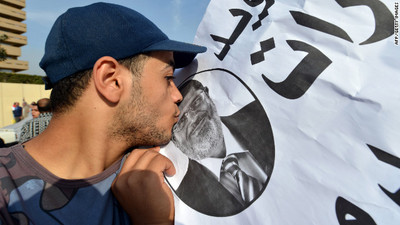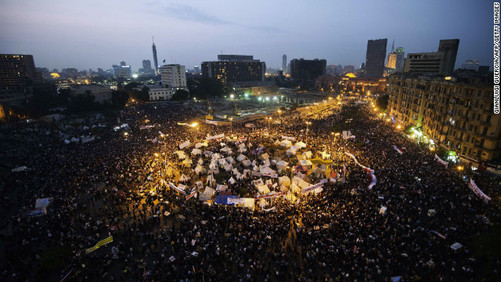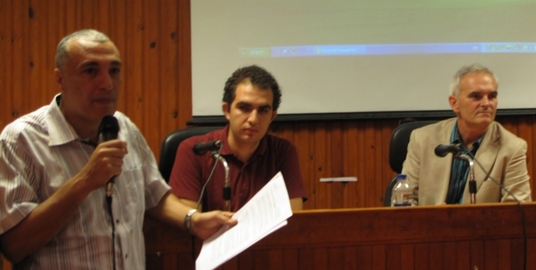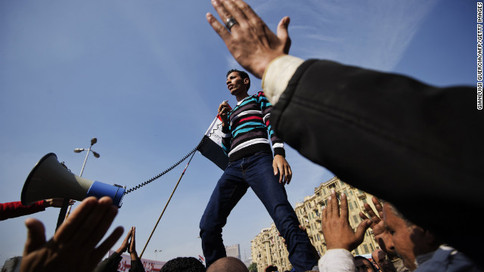 I live with the illusion that I have a fairly firm grip on reality. This, despite the fact that scientists tell us that 96% of what exists in the universe cannot be seen, detected or comprehended. (Dark Matter and Dark Energy being their technical terms!). Yet when it comes to trying to understand what is going on politically in Egypt, I feel I am clearly in the Dark Matter region of the universe. Egypt is in the midst of a profound revolution, having just elected, in mid-2012, their first President through democratic elections in 40 years. For the past two years I have been working with university students, professors and young activists there. In October, I lived in Egypt for several weeks, as part of a unique international Social Media and Global Change class I teach, connecting students in the US with students and activists in Egypt.  What I found was that despite the euphoria over that election, the Egyptian activists I met with were mostly filled with huge buckets of frustration mixed with a large dollop of deeper determination and hope that there will be a better future for all. This week, in response to President Morsi’s latest moves to take more power from the Judiciary Branch of Government, hundreds of thousands of citizens are camped out in the streets of Tahrir Square vehemently protesting his actions. This week, I asked a young activist/journalist I work with, Shorouk, to explain her take on the protests. She said she mostly keeps her head down now, focusing on her work and daily living, rather than trying to understand what is at the root of the upheaval. “It’s impossible to understand what is going on behind the scenes at this moment and to grasp the truth behind everything (due to) saturation. We're overloaded with media messages, whether from TV, newspapers, or social media, and with so many strings, it's difficult to stitch an opinion”.  Professor Modany (speaking), Ahmed Salama, Greg Tuke And this morning I received a long letter sent out by Osama Modany, an English professor at one of the universities outside Cairo. He opens his letter with this: “Current political turbulence in Egypt is simply an elitist power struggle. All political groups hovering up there, whether Islamists, or the so called secular, are corrupt to the core. Even figures like El-Bardai and Wael Ghoneim, once affiliated to political factions, will be overwhelmed with more domineering, inherently corrupt figures from the same factions. The polarization between political factions in Egypt is not based on political opinion, or each one's agenda for the well being of the country. It is simply personal gain that drives them all which is not surprising considering that these figures have lived either thriving or moaning under successive dictatorships. They were part and parcel of Egyptian politics whether on the top or at the bottom. Now, it is each of these figure's one and only opportunity to jump and secure power, manipulating in the process the fragile feelings of the ignorant majority”. (full text; click here) The level of distrust and pessimism in the governing forces of Egypt seem extraordinarily high right now, even among the optimist activists I talk with regularly. “Why is the Muslim Brotherhood choosing to not organize a counter demonstration this Friday?” Why is Morsi really going for this power grab?”.  Understanding the basic motivations and intent in the actions being taken by various moves grassroots organizational leaders and high government officials seems nearly unknowable right now. Yet, what happens in Egypt is no small matter to those of us in the west. So I invite others, particularly those of you in Egypt, to share your understanding of reality. I particularly invite responses longer than a tweet or “like” button push. Give us your perception of the Dark Matter in Egypt right now. Maybe, just maybe, as a result of the light you can shed on that reality, the 4% of what is known in the universe will grow just a hair.
7 Comments
|
AuthorGreg Tuke teaches and travels internationally, working with university faculty in India, Indonesia and the MIddle East, sharing strategies for implementing international collaborations within course work. This blog chronicles key experiences and insights about those experiences. All opinions expressed are mine, and represent no other institutional affiliation. Archives
March 2020
Categories |


 RSS Feed
RSS Feed